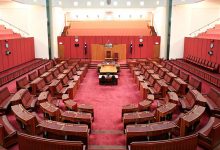Australia has finally adopted the bare minimum commitment to a net zero emissions target for 2050, but not before members of the federal Coalition government raised concerns about the impacts on the resources sector, farmers and Australian export industries.
But a Liberal senator has raised a new and rather peculiar concern, the possible end to all plant life.
Queensland Liberal-National Party senator Gerard Rennick – who does not have scientific qualifications – generally uses senate estimates to try poke holes in the work of scientific agencies like the CSIRO and the Bureau of Meteorology.
While many of Rennick’s Queensland LNP colleagues have expressed strong opposition to Australia’s adoption of a net zero target, primarily out of a desire to protect the interests of the coal and gas industries, Rennick suggested a potentially much more devastating concern – the end to all plant life on earth.
"We'll end up with a situation, if we go net zero on land and the phytoplankton is still taking more carbon out of the atmosphere, that we'll actually run the carbon levels down to an extent where we destroy our plant life" – @SenatorRennick pic.twitter.com/bBM87NDox4
— Michael Mazengarb (@MichaelM_ACT) October 28, 2021
In questions to CSIRO CEO Larry Marshall, Rennick suggested that he was concerned that achieving zero net emissions globally could deprive plant life of sufficient carbon dioxide.
“We”ll end up with a situation if we go net zero on land. And the phytoplankton is still taking more carbon out of the atmosphere, that will actually run the carbon levels down to an extent where we destroy our plant life. That’s what my concern is,” Rennick said.
It’s a curious suggestion – which is possibly based on a recent scientific study that found much of the carbon dioxide released during the 2019-20 “black summer” bushfires was absorbed by a phytoplankton bloom in the Pacific Ocean.
But it does make one wonder how the world’s plant life managed for millions of years before the world ramped up the burning of fossil fuels in the 1700s.
While atmospheric concentrations of carbon dioxide have varied throughout history, for at least 800,000 years these concentrations have not ventured anywhere near zero – even without the anthropogenic emissions that have only been added during the last couple of hundred years.
Human-caused emissions, caused primarily from the burning of fossil fuels, have sent global carbon dioxide concentrations to a level around 40 per cent higher than the previous highest historical level – amplifying global warming to a level that the IPCC labelled a “code red for humanity”.
Earlier in the week, a Nationals MP was forced to correct the record on her views about wind farms, having suggested that wind turbines did not work at night.










